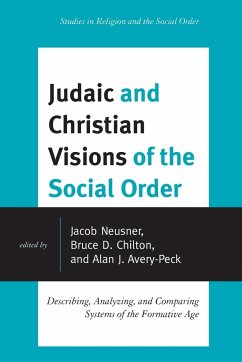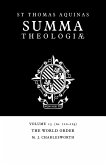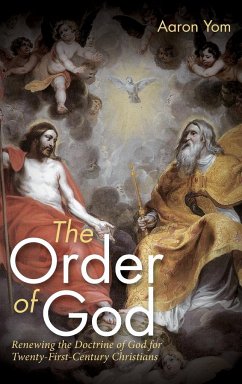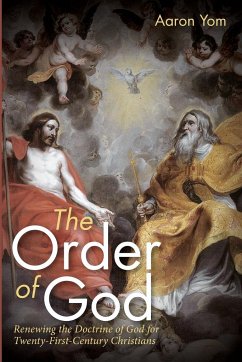Judaic and Christian Visions of the Social Order
Describing, Analyzing and Comparing Systems of the Formative Age
Herausgeber: Neusner, Jacob; Avery-Peck, Alan J.; Chilton, Bruce D.
Judaic and Christian Visions of the Social Order
Describing, Analyzing and Comparing Systems of the Formative Age
Herausgeber: Neusner, Jacob; Avery-Peck, Alan J.; Chilton, Bruce D.
- Broschiertes Buch
- Merkliste
- Auf die Merkliste
- Bewerten Bewerten
- Teilen
- Produkt teilen
- Produkterinnerung
- Produkterinnerung
The seven essays in this book address formative Judaic writings in the time of the Mishnah and the Talmud, the first six centuries of the Common Era, and formative Christianity in the first six centuries of the Common Era. The essays explore the areas where Judaism and Christianity have intersected.
Andere Kunden interessierten sich auch für
![Visions Beyond the Veil Visions Beyond the Veil]() H. A. BakerVisions Beyond the Veil10,99 €
H. A. BakerVisions Beyond the Veil10,99 €![The So-Called Egyptian Church Order and Derived Documents The So-Called Egyptian Church Order and Derived Documents]() R. Hugh ConnollyThe So-Called Egyptian Church Order and Derived Documents29,99 €
R. Hugh ConnollyThe So-Called Egyptian Church Order and Derived Documents29,99 €![The World Order The World Order]() Thomas AquinasThe World Order62,99 €
Thomas AquinasThe World Order62,99 €![The Order of God The Order of God]() Aaron YomThe Order of God40,99 €
Aaron YomThe Order of God40,99 €![The Order of God The Order of God]() Aaron YomThe Order of God26,99 €
Aaron YomThe Order of God26,99 €![Hymns of the Early Church: Being Translations From the Poetry of the Latin Church, Arranged in the Order of the Christian Year With Hymns for Sun Hymns of the Early Church: Being Translations From the Poetry of the Latin Church, Arranged in the Order of the Christian Year With Hymns for Sun]() John BrownlieHymns of the Early Church: Being Translations From the Poetry of the Latin Church, Arranged in the Order of the Christian Year With Hymns for Sun36,99 €
John BrownlieHymns of the Early Church: Being Translations From the Poetry of the Latin Church, Arranged in the Order of the Christian Year With Hymns for Sun36,99 €![Freedom or Order? Freedom or Order?]() Bryan D. SpinksFreedom or Order?37,99 €
Bryan D. SpinksFreedom or Order?37,99 €-
-
-
The seven essays in this book address formative Judaic writings in the time of the Mishnah and the Talmud, the first six centuries of the Common Era, and formative Christianity in the first six centuries of the Common Era. The essays explore the areas where Judaism and Christianity have intersected.
Hinweis: Dieser Artikel kann nur an eine deutsche Lieferadresse ausgeliefert werden.
Hinweis: Dieser Artikel kann nur an eine deutsche Lieferadresse ausgeliefert werden.
Produktdetails
- Produktdetails
- Verlag: Globe Pequot Publishing Group Inc/Bloomsbury
- Seitenzahl: 390
- Erscheinungstermin: 6. September 2011
- Englisch
- Abmessung: 229mm x 152mm x 21mm
- Gewicht: 563g
- ISBN-13: 9780761856351
- ISBN-10: 0761856358
- Artikelnr.: 33871878
- Herstellerkennzeichnung
- Libri GmbH
- Europaallee 1
- 36244 Bad Hersfeld
- gpsr@libri.de
- Verlag: Globe Pequot Publishing Group Inc/Bloomsbury
- Seitenzahl: 390
- Erscheinungstermin: 6. September 2011
- Englisch
- Abmessung: 229mm x 152mm x 21mm
- Gewicht: 563g
- ISBN-13: 9780761856351
- ISBN-10: 0761856358
- Artikelnr.: 33871878
- Herstellerkennzeichnung
- Libri GmbH
- Europaallee 1
- 36244 Bad Hersfeld
- gpsr@libri.de
Jacob Neusner is distinguished service professor of the history and theology of Judaism and senior fellow with the Institute of Advanced Theology at Bard College. He is a member of the Institute for Advanced Study in Princeton, New Jersey, and a life member of Clare Hall, Cambridge University. He holds nine honorary degrees and fourteen academic medals, along with other awards. He has published more than a thousand books. Bruce D. Chilton is the Bernard Iddings Bell Professor of Philosophy and Religion at Bard College, executive director of the Institute of Advanced Theology, and rector of the Church of St. John the Evangelist. His books include: Rabbi Jesus, Rabbi Paul, Mary Magdalene, Abraham's Curse, The Cambridge Companion to the Bible, The Way of Jesus, and The Targums (with Paul Flesher). Alan J. Avery-Peck is Kraft-Hiatt Professor of Judaic Studies and chair of the Department of Religious Studies at the College of the Holy Cross, Worcester, Massachusetts. Specializing in Jewish history and religion in the first six centuries C.E., his work includes The Encyclopedia of Religious and Philosophical Writings in Late Antiquity: Pagan, Judaic, Christian (co-edited with Jacob Neusner).
Preface Chapter 1. Foreword: How Does Religion Imagine Society? Ancient
Israel Chapter 2. From the Repertoire of the Hebrew Bible: Visions of the
Social Order Judaism Chapter 3. Enoch's Vague Visions of a Future Social
Order; Foils to its Vivid Portrayals of the Present Chaos Chapter 4.
Visions of the Social Order: The Qumran Library Chapter 5. Through Greek
Eyes: Jewish "Theocracy" and "State of the Wise" Chapter 6. Philo's
Constructs of Social Order Chapter 7. The Mishnah and Concepts of the
Social Order Chapter 8. The Social Vision of Rabbinic Judaism Chapter 9.
Torah and Culture: H. Richard Niebuhr's Christ and Culture after Fifty
Years: A Judaic Response Chapter 10. Six People You Meet in the Synagogue:
Visions of Social Order in Early Rabbinic Prayer Christianity Chapter 11.
The Kingdom of God Chapter 12. Paul's Theory of the Social Order Chapter
13. Early Christian Martyrdom, Scripture, and Social Order Chapter 14.
Irenaeus of Lyons (130-200) Re-Imagining the Cosmos from the Perspective of
the Oppressed Chapter15. Origen's Social Vision of Christian Life Chapter
16. Eusebius's (and Constantine's) Theory of the Political Order Chapter
17. Augustine of Hippo (354-430): Architect of Western Christianity's
Political Theology Conclusinos Chapter Conclusions, Observations, and
Limitations: Reflections on the Visions of the Social Order Collaborative
Project
Israel Chapter 2. From the Repertoire of the Hebrew Bible: Visions of the
Social Order Judaism Chapter 3. Enoch's Vague Visions of a Future Social
Order; Foils to its Vivid Portrayals of the Present Chaos Chapter 4.
Visions of the Social Order: The Qumran Library Chapter 5. Through Greek
Eyes: Jewish "Theocracy" and "State of the Wise" Chapter 6. Philo's
Constructs of Social Order Chapter 7. The Mishnah and Concepts of the
Social Order Chapter 8. The Social Vision of Rabbinic Judaism Chapter 9.
Torah and Culture: H. Richard Niebuhr's Christ and Culture after Fifty
Years: A Judaic Response Chapter 10. Six People You Meet in the Synagogue:
Visions of Social Order in Early Rabbinic Prayer Christianity Chapter 11.
The Kingdom of God Chapter 12. Paul's Theory of the Social Order Chapter
13. Early Christian Martyrdom, Scripture, and Social Order Chapter 14.
Irenaeus of Lyons (130-200) Re-Imagining the Cosmos from the Perspective of
the Oppressed Chapter15. Origen's Social Vision of Christian Life Chapter
16. Eusebius's (and Constantine's) Theory of the Political Order Chapter
17. Augustine of Hippo (354-430): Architect of Western Christianity's
Political Theology Conclusinos Chapter Conclusions, Observations, and
Limitations: Reflections on the Visions of the Social Order Collaborative
Project
Preface Chapter 1. Foreword: How Does Religion Imagine Society? Ancient
Israel Chapter 2. From the Repertoire of the Hebrew Bible: Visions of the
Social Order Judaism Chapter 3. Enoch's Vague Visions of a Future Social
Order; Foils to its Vivid Portrayals of the Present Chaos Chapter 4.
Visions of the Social Order: The Qumran Library Chapter 5. Through Greek
Eyes: Jewish "Theocracy" and "State of the Wise" Chapter 6. Philo's
Constructs of Social Order Chapter 7. The Mishnah and Concepts of the
Social Order Chapter 8. The Social Vision of Rabbinic Judaism Chapter 9.
Torah and Culture: H. Richard Niebuhr's Christ and Culture after Fifty
Years: A Judaic Response Chapter 10. Six People You Meet in the Synagogue:
Visions of Social Order in Early Rabbinic Prayer Christianity Chapter 11.
The Kingdom of God Chapter 12. Paul's Theory of the Social Order Chapter
13. Early Christian Martyrdom, Scripture, and Social Order Chapter 14.
Irenaeus of Lyons (130-200) Re-Imagining the Cosmos from the Perspective of
the Oppressed Chapter15. Origen's Social Vision of Christian Life Chapter
16. Eusebius's (and Constantine's) Theory of the Political Order Chapter
17. Augustine of Hippo (354-430): Architect of Western Christianity's
Political Theology Conclusinos Chapter Conclusions, Observations, and
Limitations: Reflections on the Visions of the Social Order Collaborative
Project
Israel Chapter 2. From the Repertoire of the Hebrew Bible: Visions of the
Social Order Judaism Chapter 3. Enoch's Vague Visions of a Future Social
Order; Foils to its Vivid Portrayals of the Present Chaos Chapter 4.
Visions of the Social Order: The Qumran Library Chapter 5. Through Greek
Eyes: Jewish "Theocracy" and "State of the Wise" Chapter 6. Philo's
Constructs of Social Order Chapter 7. The Mishnah and Concepts of the
Social Order Chapter 8. The Social Vision of Rabbinic Judaism Chapter 9.
Torah and Culture: H. Richard Niebuhr's Christ and Culture after Fifty
Years: A Judaic Response Chapter 10. Six People You Meet in the Synagogue:
Visions of Social Order in Early Rabbinic Prayer Christianity Chapter 11.
The Kingdom of God Chapter 12. Paul's Theory of the Social Order Chapter
13. Early Christian Martyrdom, Scripture, and Social Order Chapter 14.
Irenaeus of Lyons (130-200) Re-Imagining the Cosmos from the Perspective of
the Oppressed Chapter15. Origen's Social Vision of Christian Life Chapter
16. Eusebius's (and Constantine's) Theory of the Political Order Chapter
17. Augustine of Hippo (354-430): Architect of Western Christianity's
Political Theology Conclusinos Chapter Conclusions, Observations, and
Limitations: Reflections on the Visions of the Social Order Collaborative
Project








